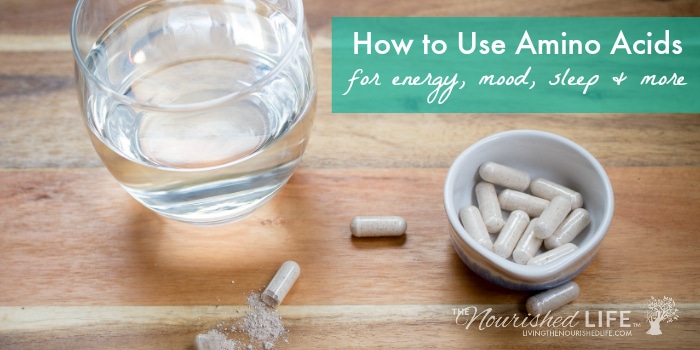Are you crashing at 3pm every day? Or is your mind racing at night when you should be sleeping? Or do you sometimes feel like everyday life is wrapped up in a fog? Amino acid therapy might be able to help.
It’s true, the way you live and eat have a huge impact on how you feel – your energy, your mood, and your sleep. But amino acids can help you bridge the gap between knowing what you should do… and actually doing it.
We chug energy drinks in the morning and throw back a few sleeping pills at night – if we’re lucky we’ll get a few things done and log a few hours of sleep every day.
But if you’re trapped in this cycle (and I’ve been there), you’re stuck propping one bad habit up with another had habit. It’s a vicious circle that can feel impossible to break (again, I’ve totally been there).
Amino acid supplements can help.
Julia Ross talks extensively about amino acid therapy in her books The Diet Cure and The Mood Cure.
Amino acid therapy works because your body uses amino acids to build brain chemicals – important neurotransmitters like dopamine – that can help you feel more energized, focused, cheerful, or relaxed (depending on which amino acids are used).
Ideally, you’ll use amino acids for a few weeks or months to help you end that cycle of bad habits. Once you find yourself sleeping better and focusing more, it gets easier to make other healthy habits that contribute to your overall energy, mood, and wellbeing.
From there, it’s like a happy snowball effect – each small change leads to another.
Usually at this point, you’ll no longer need the amino acids, because you’ve built a healthier lifestyle that naturally keeps those feel-good brain chemicals at the right levels. Honestly, you’ll probably just forget to take them and realize you don’t need them anymore (if you’re anything like me).
How I’ve Used Amino Acid Therapy Over the Years
I personally have used amino acid therapy on and off for the last 7-8 years. Once I found which amino acids were most effective for me and got the dosage right, I discovered that changes were immediately noticeable.
I can go months without needing any amino acid supplements, but if I start noticing my sleep habits are getting worse, or I’m fighting to get out of bed and get going every day, I know what to do.
Usually, there’s an underlying cause like too much stress or an emotional event – or maybe my eating habits haven’t been supporting my health or I’ve gotten out of the practice of meditating.
So even though the root cause needs to be addressed – if you’re stuck in that exhausted or anxious or unmotivated state… it can be really tough to make the right choices!
Below are a few of the amino acid supplements that have made a difference for me:
(All the dosages below are based on Julia’s recommendations in her books, which I highly suggest reading before embarking on an amino acid therapy program. Remember it is always best to start with a small dose and increase as needed.)
NOTE:
If you feel that every day is a struggle, if you feel manic or depressed, or if you’re having suicidal thoughts or are self-harming, please seek help. Therapy can be life-saving, and there is nothing wrong with using medication if you need it. The right therapist or doctor can work alongside you to help you feel your best. And *hugs* to you. You deserve to feel better.
A Guide for Which Amino Acids Help with Energy, Mood, Sleep & More
Amino Acids for Energy and Focus
Phenylalanine:
This is an essential amino acid which cannot be manufactured by the body. Phenylalanine is used to produce tyrosine (see below), and is one of the best amino acids for energy and better moods. Phenylalanine supplements are used to treat fatigue, low moods, premenstrual syndrome (PMS), food cravings and overeating, and even chronic pain.
In supplemental form, you can use D-phenylalanine, L-phenylalanine, or DL-phenylalanine (DLPA). The first is especially useful in relieving pain, the second is also effective but slightly more stimulating, and the third is a combination of the first two forms. Start with 500 mg, one to three times daily, and gradually increase up to 1,000 mg three times daily as needed. Do not exceed 5,000 mg daily.
DLPA has been very helpful to me in the past. I’ve used it to help end coffee cravings. It’s also helped me recover from periods of deep emotional stress and strain (when getting out of bed in the morning starts to feel too difficult). In my experience, DLPA has been surprisingly effective. When I take DLPA, even when I don’t “feel” it – I notice things start to get done again. Deadlines are met and the laundry is folded and I have the energy to do my makeup, etc. I’ve only had to use it for short periods and the benefits seem to be long-lasting.
Tyrosine:
This amino acid is a precursor of adrenaline, dopamine, and norepinephrine, which are important for maintaining a sense of well-being and energy, and also promote a healthy metabolism and nervous system.
Tyrosine also works with iodine to promote thyroid health. Supplemental L-tyrosine is excellent for treating fatigue, low moods, depression, low sex drive, and anxiety. Tyrosine and phenylalanine can be used in conjunction.
Some people benefit more from one or the other; it’s important to work with both of them to find the right balance for your individual needs (I personally do much better on DLPA than tyrosine, though it took some experimenting to figure that out!). Dosage begins at 500 mg, one to three times daily. Increase dosage as needed, up to 2,000 mg three times daily.
The Best Amino Acid Supplement for Gut Health and Sugar Cravings
Glutamine:
L-glutamine supplements are among the most popular amino acid supplements for many reasons. They are useful for treating fatigue and depression. Glutamic acid, which is derived from glutamine, is essential for ideal brain function.
During times of stress, your body uses up mass amounts of glutamine that can easily be replaced with a supplement of L-glutamine to keep you functioning at your best. Glutamine is awesome iin a few different ways:
- It’s highly effective at fighting sugar and starch cravings.
- Glutamine is used to aid muscle recovery when taken before or after exercise.
- It’s also said to support digestive health and helps your gut system function optimally.
Suggested dosage is between 500-1,500 mg up to three times daily before meals.
Amino Acids for Relaxation and Sleep Support
GABA
GABA is actually an amino acid and a neurotransmitter. It works incredibly well at relaxing the nervous system even in small doses. GABA works very quickly and is often best taken as a sublingual or chewable tablet. Take 100mg of GABA 2-3 times daily when you’re feeling “wired” or stressed. GABA works very well for emotional tension or nervous stress.
Many GABA supplements use higher doses, but more is not better in the case of GABA. You’ll probably do well on 100-250mg per dose. If not, a small percentage of people need 500-750mg per dose, but that is the maximum recommended by amino acid expert Julia Ross. For me, higher doses in the evening give me crazy dreams that disrupt my sleep. If GABA doesn’t seem to be working for you, instead of raising your dose, you can try theanine instead (see below).
Theanine
Theanine is the amino acid that made green tea famous. It’s calming and relaxing, similar to GABA. I personally have enjoyed taking theanine as a GABA alternative. It gives me that calm, grounded feeling. I also like taking 100mg with my coffee in the mornings, because theanine and caffeine make an excellent combination for jitter-free focus.
Theanine works well in small doses. Try 100-200mg 2-3 times daily when you’re feeling stressed or need to wind down before bed. I haven’t noticed any negative effect on my dreams from Theanine, which is another reason I like using it at night.
Amino Acids for Well-Being and Mood Support
Tryptophan:
This essential amino acid is a precursor to the neurotransmitter serotonin. Serotonin is important for providing a feeling of calm and well-being. A deficiency of serotonin can result in depression, anxiety, insomnia, excessive anger and mood swings. You might also find yourself craving sweets and carbs in the afternoons and evenings if you’re low on this important neurotransmitter.
Tryptophan supplements are quite effective and act quickly to help produce optimal levels of serotonin. Take 500-1,000 mg up to three times per day. This is one of the best amino acids for sleep, so a dose about 30-60 minutes before bed can really make a difference.
5-HTP
Tryptophan turns into 5-HTP in your body before it turns into serotonin. In that sense, it has the same benefits you’d expect from tryptophan. Some people find 5-HTP is more effective than tryptophan, others find it too strong and easily overdosed (that’s me – I have to be extremely careful dosing 5-HTP and most of the time I just avoid it).
Typical 5-HTP dosage is 50-200mg once in the mid-afternoon and once in the evenings. If you have serious cravings or mood dips around lunchtime, you can add a third dose twenty minutes before lunch. Again, start slow and work up until you find the right dosage. For some, 50mg once in the evenings is enough.
Occasionally, 5-HTP has a more energizing effect than tryptophan. If you think 5-HTP if interfering with your sleep, switch to tryptophan and see if it helps. If not, try switching to GABA or theanine (see above) in the evenings.
Tips For Taking These Amino Acid Supplements
- Look for free-form amino acids in capsule or powder form to enhance absorption. Tablets are inferior because additives and binders make them more difficult to break down and utilize. Powder form is the most easily absorbed and will often have no additives at all.
- Take all amino acids between meals (at least twenty minutes before you eat or ninety minutes after you eat). This prevents these therapeutic amino acids from competing for absorption with amino acids from the protein you eat.
- Stimulating amino acids like tyrosine and phenylalanine compete with relaxing amino acids like tryptophan. Use stimulating amino acids in the morning and/or early afternoon to help boost your energy and focus levels. Use relaxing amino acids in the late afternoon and evenings when you need to wind down.
Remember: Amino acid therapy should be used to help you create better habits that will naturally support your energy, moods, and sleep.
Once you start feeling better (usually within 1-2 weeks you’ll notice a difference), add some healthy habits to your daily routine – like meditation, eating balanced meals, sleeping more, journaling, connecting with friends and family, going for a walk, etc.
(Getting plenty of protein is also an important part of stabilizing your energy and moods. Learn more about getting enough protein here.)
Have you tried any of these amino acid supplements? Tell me your thoughts in the comments below!
More Emotional Health Articles:
- How to Reduce Stress Hormones
- 5 Deep Breathing Benefits
- Want to Stop Anxiety? You Need to Do This First



